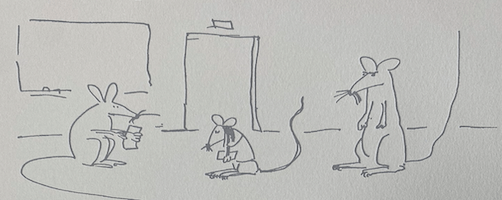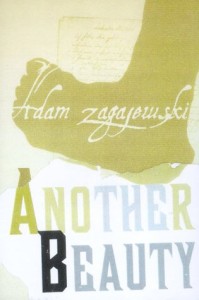I’ve been reading Adam Zagajewski’s recent book of poetry, Unseen Hand, translated by Clare Cavanagh. Zagajewski writes in Polish, and I’ve long admired his work.
I encountered this poem of his just after I had reread a poem of Larry’s about envisioning his mother’s funeral. Yes, Larry, too is a poet. His poem is from his book called Night Train. Here are the two:
 About My Mother
About My Mother
I could never say anything about my mother:
how she repeated, you’ll regret it one day,
when I’m not around anymore, and how I didn’t believe
in either “I’m not” or “anymore,”
how I liked watching as she read bestsellers,
always turning to the last chapter first,
how in the kitchen, convinced it wasn’t
her proper place, she made Sunday coffee,
or even worse, filet of cod,
how she studied the mirror while expecting guests,
making the face that best kept her
from seeing herself as she was ( I take
after her in this and other failings),
how she went on at length about things
that weren’t her strong suit and how I stupidly
teased her, for example when she
compared herself to Beethoven going deaf,
and I said, cruelly, but you know he
had talent, and how she forgave it all
and how I remember that, and how I flew from Houston
to her funeral and couldn’t say anything
and still can’t.
Adam Zagajewski, translated by Clare Cavanagh
***************************
 When I go to your funeral
When I go to your funeral
I’ll be clean-shaven & have
a fresh haircut. I’ll wear
a black silk tie with a Windsor
knot, a charcoal-grey suit
(3-buttoned, with vest).
My socks will match.
My shoes will be shined.
I’ll look real sharp, Mom.
And everyone will murmur
“now there’s a young man
with promise” & everything
will be like it once was—
before the pulleys creak
& the ropes slowly lower
your coffin out of the red
clay granite sunshine
of western Oaklahoma.
Larry Rafferty
I think Larry stands up pretty well with Zagajewski, although I have to admit that the lines:
how she studied the mirror while expecting guests,
making the face that best kept her
from seeing herself as she was
are pretty breathtaking in their unsparing appraisal. I’m just glad I wasn’t Mr. Zagajewski’s mother! As for Larry, well, I’m his wife and have often felt that unsparing, appraising eye–but tempered with fondness.

 They are already growing shorter now, but this passage from Adam Zagajewski’s new book of essays, Slight Exaggeration, perfectly captures the experience of the long evenings–even longer in northern Europe:
They are already growing shorter now, but this passage from Adam Zagajewski’s new book of essays, Slight Exaggeration, perfectly captures the experience of the long evenings–even longer in northern Europe:


